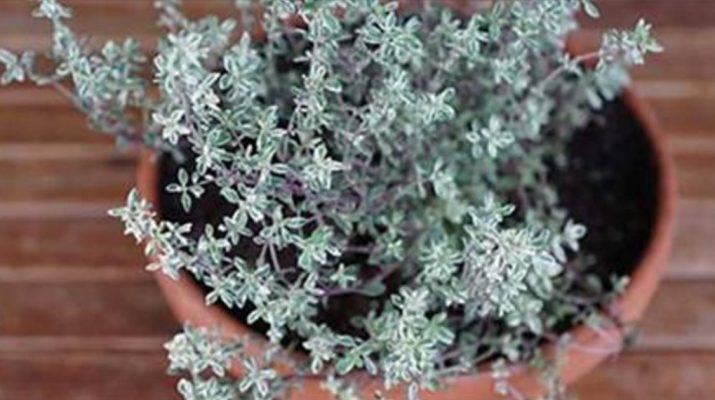According to Christine Ruggeri, CHHC:
“The oldest Egyptian medical text, called Ebers Papyrus, dates back to 1550 B.C., and it records the healing values of thyme. The ancient Egyptians used thyme for embalming, and the ancient Greeks used it in their baths and temples; they believed that it brought on feelings of courageousness.
In the European Middle Ages, thyme was placed beneath pillows to aid sleep and ward off nightmares; the herb was also laid on coffins during funerals because it was believed that it provided a safe passage to the next life.”
It has a rich, strong, herbaceous aroma, and the name is derived from the Greek word ‘thymos’ which means ‘to perfume.’
Mrs. Ruggeri adds:
“Because the thyme plant is grown in many environments, climates, and soils, there are over 300 varieties with different chemotypes. Although they all look the same, the chemical composition is different along with the corresponding health benefits. The chief constituents of thyme essential oil typically include alpha-thujone, alpha-pinene, camphene, beta-pinene, para-cymene, alpha-terpinene, linalool, borneol, beta-caryophyllene, thymol, and carvacrol. “
Depending on the location the plant grows in, these chemical components of the oil distilled from the plant vary. For beginners, Linalool ct. Thymus vulgaris is the best oil, since it is not harsh for the skin, and can be freely used by the elderly and children. Other popular oils are thymus vulgaris ct. thujanol, thymus vulgaris c.t carvacrol, and thymus vulgaris ct. thymol.
Here are some of the properties of the most common thyme chemotypes, explained in an article published in The Truth About Cancer website:
Thymus vulgaris ct thymol – Between 60-70 percent thymol, this chemotype has strong antiseptic properties. It has a high level of antioxidants, with strong anti-inflammatory and pain-relieving benefits.
Thymus vulgaris ct linalool – One of the gentlest of thyme chemotypes, it commonly grows at high altitudes and has potent antifungal and anti-parasitic properties.
Thymus vulgaris ct carvacrol – Between 30-80 percent carvacrol (depending on when it is harvested), it also has potent anti-inflammatory, analgesic (pain relieving) and antioxidant properties.
Thymus vulgaris ct 1,8 cineole – Is 80-90 percent cineole, with an interesting array of benefits. It is a good expectorant (phlegm releaser), diuretic (increases the expulsion of urine), and analgesic properties.
Thymus vulgaris ct thujanol – About 50 percent thujanol, this chemotype is known to support the immune system. It is found mainly in the wild, known commonly as Sweet Thyme.
Thyme oil has powerful antibacterial antifungal, antiviral, diuretic, antiseptic, and antispasmodic properties, so it detoxifies the body, strengthens the immune system, destroys microbes, and supports the formation of white blood cells.
Thyme has a myriad of health benefits, as follows:
— It boosts blood circulation to accelerate healing, improves memory and concentration, and raises blood pressure.
— Its powerful antibacterial properties kill various bacteria, including staphylococcus, and purifies the air from Proteus, streptococcus, staphylococcus, and cryptococcal.
— It fights respiratory infections, coughs, colds, and the flu, bronchitis, sore throats, catarrh, asthma, and laryngitis.
— It is a powerful natural remedy in the case of psychological and physical weakness, as it revives the body and mind, so use it to treat chronic fatigue, depression, insomnia, and accelerate the recuperating after an illness.
— Thyme essential oil boosts the secretion of mucus and relieves dry coughs
Furthermore, this amazing essential oil offers countless other medicinal properties, such as:
- You can use it as a natural hand sanitizer, and in the form of a hot compress to soothe rheumatic pain, sciatica, sprains, muscular pains, sports injuries, and gout
- Dilute it and apply it on the affected area to relieve Athlete’s foot, insect bites, and stings
- To improve the health and appearance of the hair, use it on the hair as a hair tonic
- Mix it with some other essential oil such as pine, lemon, lavender, rosemary, and grapefruit, and prevent skin irritations
- It destroys nail fungus, candida, and vaginitis
- It fights infections on the bladder and urinary tract
- The regular consumption boosts the DHA amount (docosahexaenoic acid, which is an omega-3 fatty acid) in the brain, kidney, and cell membranes in heart
- To treat alopecia, combine it with lavender, rosemary, and cedar wood in a jojoba and grape seed oils mixture, and massage the scalp daily
- To treats acne and warts, you can use it as a face wash
- Enjoy a bath with several drops of this oil to treat irregular or weak menstruation
- Use 1% solution as an antibacterial spray for fresh produce

